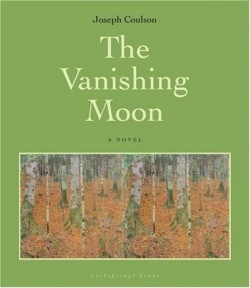The Vanishing Moon
A Novel
This is the steel of working-class, Mid-Western America described by a poet. What the story lacks in hope is counteracted by the beauty of the author’s narrative, which captures a fine balance of collective suffering and individual bittersweet memory.
The story is a series of personal narratives, each describing the emotional knot of experience that holds three generations of the Tollman family together. Through one family’s experience, the book catalogues the salient historical events of twentieth-century America: The Depression, WWII, Vietnam, JFK’s assassination, the advent of the civil rights and Black Power movements.
This is Coulson’s first novel; it follows three published books of poetry and a play, A Saloon at the Edge of the World, which was produced in San Francisco. The bleakness of the story resides in suffering without reward, most poignantly in the case of Jessica, the story’s matriarch, who loses two children, her home, her husband, and finally her sight. Her painfully sad life ends without fanfare. She is disdained by her class-conscious daughter-in-law, and her grandchildren prefer not to see her because she smells of “urine and disinfectant.”
Coulson’s narrative is poetic in both style and content. The youngest narrator, James, remarks how there were “no lilacs in the spring of 1968.” The author reinforces this motif: “April arrived like a car on fire. Television and magazines showed pictures of the dead: soldiers and civilians in Vietnam; Martin Luther King in Memphis. Not even the gardens along Lake Shore Drive had lilacs that year.”
Describing The Great Depression, Coulson uses language and memory to soften a brutal reality: “Fear swept through Cleveland like a grass fire. Banks closed and soup kitchens opened. Small business collapsed in a flurry of pink slips.”
Hope appears towards the end of the novel with the youngest generation, in James’s narrative section as he tells of the end of the Vietnam War and his brother’s reprieve from the draft: “The poor were surrounded by friends. The air was empty of fear. No other news mattered.” It is a brief moment of bounty, but it nevertheless provides the reader with a glimmer of hope that James’s generation will not suffer so much as the last.
The different narrative perspectives, along with Coulson’s detailed social and historical referencing, give this story authenticity of character and context. The choice of multiple narrative voices also lends itself well to the subject matter in creating a kind of collective voice of generic, working-class America.
Reviewed by
Lara Williams
Disclosure: This article is not an endorsement, but a review. The publisher of this book provided free copies of the book to have their book reviewed by a professional reviewer. No fee was paid by the publisher for this review. Foreword Reviews only recommends books that we love. Foreword Magazine, Inc. is disclosing this in accordance with the Federal Trade Commission’s 16 CFR, Part 255.

